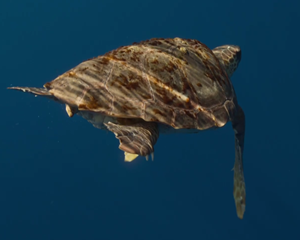Floating islands of weed are always attractive to creatures looking for shelter out in the big blue.
对于在大海中寻找居所的生物来说,漂浮的水草总是很有吸引力。
But, in today's ocean, they are being replaced by something else... plastic.
然而如今的海洋中,取代水草浮岛的是,塑料。
12 million tons of it end up in the ocean every year.
每年有1200万吨塑料最终流入海洋。
The deadliest kind are discarded fishing lines and nets.
最致命的是废弃的渔线渔网。
Each year, it's likely over half a million animals are ensnared and killed by these "ghost nets."
每年,约有50多万只动物被这些"幽灵网"困住并死亡。
But some animals are learning how to take advantage of the plastic rafts... and use them for shelter, or even as a home.
但有些动物在学习如何利用这些塑料筏,将其作为庇护所,甚至作为家。
This male Columbus crab -- barely bigger than your thumb nail -- is a castaway.
这只和拇指指甲差不多大的雄性哥伦布蟹漂泊无归。
Clinging to his net, he may have been drifting on ocean currents for months.
它紧紧抓着网,可能已经在洋流中漂流了数月。

Now, fully grown, he needs to find a partner. But where?
如今它已经长大了,需要找个伴侣。但哪儿找呢?
Certainly not here, alone on the net.
肯定不是这儿,这儿只有它孤零零一个。
Columbus crabs are not good swimmers, so this male is marooned.
哥伦布蟹并不擅长游泳,因此这只雄蟹走投无路。
Perhaps a passing loggerhead turtle could be the chance to hitch a lift.
也许一只路过的红海龟是个搭便车的好机会。
Made it! But there's more than one passenger here -- a female Columbus crab!
成功抵达!可这里还有别的乘客,一只雌哥伦布蟹!
They waste no time in getting acquainted... and start to mate.
它们决定不浪费时间熟悉彼此,而是直接开始交配。
This pair may well stay together for the rest of their lives.
这对哥伦布蟹很可能会一起度过余生。
A turtle, after all, makes an excellent home.
毕竟,海龟身上是个完美的家。
In return, the crabs provide an onboard grooming service.
作为回报,哥伦布蟹会提供甲板清洁服务。



